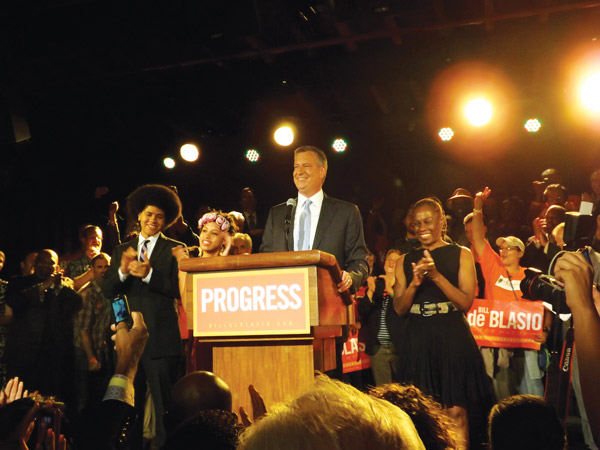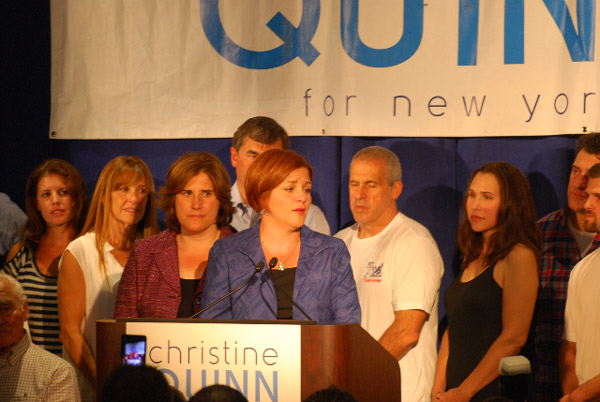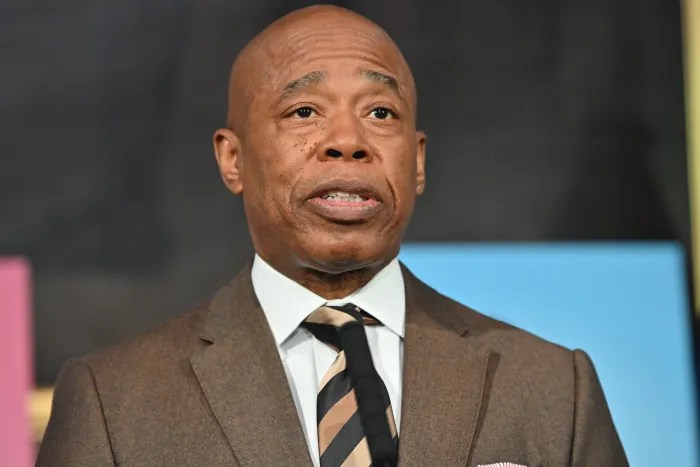 BY WINNIE McCROY | After a hotly contested race for the Democratic nominee for New York City Mayor, Bill de Blasio has garnered 40 percent of the votes. Although thousands of paper ballots still need to be counted, de Blasio appeared to have enough primary votes to avoid an October 1 runoff election. Former Comptroller William C. Thompson, Jr., who finished second with 26 percent, remained defiant on primary night, refusing to concede the race — while longtime Chelsea legislator and City Council Speaker Christine C. Quinn trailed, with 15 percent of the votes. The third place showing, which included the loss of her own district, was a surprisingly weak end to a campaign that once found her polling at 60 percent.
BY WINNIE McCROY | After a hotly contested race for the Democratic nominee for New York City Mayor, Bill de Blasio has garnered 40 percent of the votes. Although thousands of paper ballots still need to be counted, de Blasio appeared to have enough primary votes to avoid an October 1 runoff election. Former Comptroller William C. Thompson, Jr., who finished second with 26 percent, remained defiant on primary night, refusing to concede the race — while longtime Chelsea legislator and City Council Speaker Christine C. Quinn trailed, with 15 percent of the votes. The third place showing, which included the loss of her own district, was a surprisingly weak end to a campaign that once found her polling at 60 percent.
Speaking to her supporter from primary headquarters (at The Dream Hotel, West 16th St. in Chelsea), a gracious Quinn said, “I want to congratulate my opponents Bill Thompson and Bill de Blasio on a hard-earned victory. While we disagreed on some issues, we all cared deeply about this city and we all shared the same goal: greater opportunity for all New Yorkers in every neighborhood.”
Quinn was flanked by her family and her partner, Kim Catullo, who she called “one of the most compelling champions this campaign had” as she conceded the race.

Public Advocate Bill de Blasio flanked by his son, Dante, his daughter, Chiara and his wife, Chirlane McCray.
Across town at de Blasio’s headquarters at Brooklyn’s Bell House in Gowanus, crowds spilled out onto the street, where a block party was set up, complete with food trucks and speakers. Hasidic Jews rubbed elbows with young Occupy Wall Street types as the NYPD jostled them all onto the curb.
“I voted for Bill because I believe in the focus of his campaign about economic equality and narrowing the gap that for the last 20 years has widened immeasurably,” said Brooklyn voter Katie. “Most New Yorkers want a mayor that’s going to focus on that gap and policies that are friendly to workers, affordable housing, extending child care, and I think he’s got a good vision.”
Former Public Advocate de Blasio went into the primary elections with a slight lead, as a NBC4 New York/Wall Street Journal/Marist Poll gave him 36 percent of Democratic voters, with former Comptroller Bill Thompson and City Council Speaker Christine Quinn following closely with 20 percent each. A September 7 Quinnipiac University poll found de Blasio to have an approval rating of as high as 43 percent.
On the morning of Tuesday, September 11, de Blasio and his wife Chirlane McCray walked from their home to the Park Slope branch of the Brooklyn Public Library to cast their ballots.
“Over the last few weeks this became a debate about where we need to go. I think most people in this city think we need a new direction, a more progressive government that reaches out to every kind of New Yorker in all five boroughs,” de Blasio told reporters there.
Up in Harlem, Thompson told the press he voted for himself, and Quinn and her wife Kim Catullo voted at Chelsea Prep on Ninth Avenue and 26th Street.
“I always knew this was gonna to be a fight to the end, a fight to figure out who the top two candidates were gonna be, and I’m incredibly confident, particularly given the amazing response I’ve been getting all over the city in the past few days, that I’m gonna be in the runoff and three weeks from now we’ll be right back here again,” Quinn told reporters at that time.
ENDORSEMENTS NOT ENOUGH
Quinn went into the September 10 primary elections armed with endorsements from New York City’s three biggest papers — The New York Times, the Daily News, and the New York Post. Quinn also had the support of Chelsea Now, as endorsed in our August 28 issue.
“Our choice is the candidate with the fortitude to translate lofty ambitions into workable solutions, and the negotiating skills to broker compromise between stalled parties. Our choice is a longtime Chelsea resident who, in public and behind the scenes, has been an effective advocate for tenant rights. Our choice is Christine Quinn,” Chelsea Now opined.
Just 17 days before the primary, the Times called 47-year-old Quinn “the best in the group,” someone who “has shepherded through important laws protecting New Yorkers’ health, safety and civil rights, including measures banning public smoking, protecting tenants and small businesses, and battling slumlords,” they wrote in an August 24 article
Quinn found her political legs by standing by Mayor Michael Bloomberg’s side during her seven years as Speaker, while simultaneously crafting the City Council into what the Times called “a forceful and effective legislative body.” But despite her many endorsements, Quinn’s popularity among voters took a deep dip in recent months.
She raised voters’ hackles when she supported Bloomberg’s override of New Yorkers’ vote to enact term limits. Critics bandied around phrases such as “a stooge of Bloomberg” and “Bloomberg clone,” with some touting the slogan, “Anyone but Quinn.” Quinn pointed out that de Blasio also supported ending term limits before “flip-flopping” and opposing Bloomberg.
Although the Times did not endorse the progressive de Blasio, they did praise him as “the most forceful and eloquent of the Democrats in arguing that New York needs to reset its priorities in favor of the middle class, the struggling and the poor.” Yet while they expressed admiration for his insistence that education, pre- and after-school programs and good hospitals were “vital to securing the city’s future,” they questioned what would happen when these “legislative long shots” were “smashed on the rocks of Albany.”
Bloomberg also ripped on these campaign promises, noting that de Blasio’s tax hikes on the rich would require approval from the state Legislature and Governor Andrew Cuomo.
“You know that Albany, under no circumstances, nor the governor, under any circumstances, is going to allow that! So come up with some real ideas, Bill!” the mayor said in a September 7 New York Post article.
But de Blasio, who in July was in a distant fourth place, experienced a come-from-behind surge by tapping into voters’ concerns over the rift between the rich and poor, stop-and-frisk, and education.
“For the Democrats, we believe Christine Quinn is the only candidate who has shown the basic common sense any mayor needs,” wrote the New York Post. “On the Republican side, Joe Lhota’s record of achievement and solid ideas on tough issues offer the best chance for an accountable and effective government.”
But they also criticized her support of “the ill-advised mandatory sick leave bill,” and her decision to attack stop-and-frisk after formerly saying she would retain Ray Kelly as police commissioner.
With a headline reading, “She’s the One,” on August 21 The Daily News touted the city’s gains under Quinn, including “crime lower than it has ever been, employment at a record level, neighborhoods reborn, the schools rescued from a culture of failure and an economy enlivened by cutting-edge high-tech enterprises.”
“[S]he combines the clearest understanding of the difficulties facing the city with the most extensive record of getting things done. Her proposals for the working and middle classes could actually come to fruition, as opposed to the many pie-in-the-sky pronouncements of her competitors,” wrote the Daily News.
At the end of the day, however, Quinn did not get enough votes to continue leading the city, saying, “No campaign maybe in the history of this city has had the overwhelming grassroots support we’ve seen over the past month. Thousands of volunteers from every corner of the five boroughs, from 16 years old to 87 years old, knocked on doors, made telephone calls, helped share our message to voters…I can’t express how grateful I am to each and every one of you…you are the future of this great city and of the Democratic party. And although I’m obviously disappointed by the results, all of you guys couldn’t make me more optimistic about the future of our city.”
Election Day will be held on November 4. De Blasio will face former Giuliani budget director and deputy mayor of operations Joe Lhota in the race, but there is no possibility of any Republican candidate winning the NYC mayoral race this year.

Despite numerous endorsements (Chelsea Now’s among them), Christine Quinn was unable to shake her image as a pro-business candidate who orchestrated the overthrow of term limits.
IS HOMOPHOBIA, SEXISM OR RACISM THE CUILPRIT?
At about the same time as Quinn secured the nominations of the Big Three (and Chelsea Now), her popularity — once at 60 percent — began dropping. With de Blasio’s recent ad campaign, his popularity began to rise, a phenomenon that some pundits dubbed “the Dante effect,” after de Blasio’s mixed-race son, Dante, who sports a huge Afro.
The ads show 15-year-old Dante addressing such issues as stop-and-frisk and progressive politics, and then revealing that the candidate is his father. On Sept. 4, Quinn began airing her first attack ad of the election season, in which she advised voters to “take a closer look” at de Blasio’s claims, and ran a video of him saying, “You can’t eliminate the basic police tactic of stop-and-frisk because it is a valid policing tactic.” Thompson also called out de Blasio on his assertion that he was the “only” candidate who would improve stop-and-frisk, calling the ad “inaccurate.”
But the ads resonated with voters as it tapped into fears about police tactics, the economic recession and a deep unhappiness with Mayor Bloomberg. They catapulted de Blasio from a long shot to a front-runner in just one month, and allowed many average voters to identify with this regular family man over the cold and distant multi-billionaire mayor they had come to despise.
Bloomberg further riled up voters when he called de Blasio’s campaign “racist” for exploiting his biracial family and promoting “class warfare.” Thompson called Bloomberg’s comments “utterly ridiculous,” and Quinn called them “extremely unfortunate,” but they obviously had an effect on voter’s perception of the candidates.
Earlier in August, Quinn’s campaign suggested that homophobia might be more to blame than her campaign record.
“I knew that being a woman and being a lesbian and being different — and then all the other reasons — she was going to be a target,” Quinn’s wife, Kim Catullo told the New York Times in an August 18 article.
Others put more stock in good old-fashioned sexism as the culprit.
“Chris would have been a great leader, a presence in our community,” said transgender former Judicial Delegate Melissa Sklarz. “Is it homophobia, is it sexism, is it people who don’t like red hair? We don’t know.”
During her concession speech, Quinn spoke of a young girl she had met earlier that day on the Upper West Side, who burst into tears upon meeting the woman who was running for mayor of New York City.
“This was a hard-fought race. We took a lot of knocks. We’re lucky to survive, but I’m proud of the race we all ran,” said Quinn. “It may not have been the outcome we wanted, but there’s a little girl out there who was inspired by the thought of New York’s first woman mayor and said to herself, ‘You know what, I can do this.’ There’s an LGBT teen out there doubting themself because of who they are, who saw this and knew thay they were not alone, that they can do anything they dream of. That alone makes all of our hard worth work it.”
GAYS FOR, AND AGAINST, QUINN
Despite the promise of seeing the first-ever lesbian and female mayor of New York City, some LGBT voters were not enthusiastic about Quinn’s candidacy. They criticized her as a pro-business candidate who did not represent the needs of everyday New Yorkers or progressive liberal gays. During a NY1 News Exit Poll, LGBT voters supported de Blasio 47 percent over Quinn’s 39 percent.
De Blasio experienced a recent surge in popularity directly preceding the election, helped in the LGBT community by outspoken advocacy from actress Cynthia Nixon. A September 8 Politicker article noted that at a recent rally on the steps of Brooklyn Borough Hall, Nixon rallied voters, saying, “We’ve got to come out in droves on Tuesday.”
But gay elected officials supported Quinn’s bid for mayor, among them State Assemblymember Danny O’Donnell, Council Members Jimmy Van Bramer and Rosie Mendez, and State Senator Brad Hoylman, who reportedly got smacked in the face by anti-Quinn supporter George Capsis for his efforts.
At the Quinn primary headquarters, Human Rights Campaign employee Marilyn Abalos said, “We endorsed Quinn, we think she’s an experienced leader and we hope she’ll make the runoff tonight. It would be great to have a woman and a lesbian there, not only because she’s a woman and a lesbian, but she’s probably the most experienced among all seven candidates at running the city.”
Chelsea Now pointed to Quinn’s work as a Council staffer in the Giuliani era to save AIDS services, adding, “in this campaign, she’s the only candidate putting forward new proposals on LGBT concerns — regarding both homeless youths and housing for seniors.”
Kew Garden couple Kevin Uhrin and William Self have supported Quinn since her early days at the Anti-Violence Project, saying that she was a candidate who cared not just about Manhattan, but about every neighborhood.
“She understands what are and what are not city issues, which is what de Blasio’s campaign seems to be about,” said Self. “She has worked for all the different communities, and she more than anyone else knows local politics.”
But for the time being, it appears as though Quinn’s work is done. But her love and commitment toward the people of Chelsea and the city as a whole continues.
“Our campaign was built on a deep and abiding faith in this city, a city that must always remain a glowing beacon of opportunity and hope to people around the world,” said Quinn in her closing comments. “A place that makes a simple promise to each of us, the same promise it made to my grandparents and each of yours: if you work hard, and you’ll be able to provide a better life for your children and grandchildren. We believe New York is still that place.”
But some voters had a different idea of how to achieve these gains. As young de Blasio voter Alberto said, “I want to change New York City for the better. De Blasio is this change, and I’m happy to be part of it. We love what Bill stands for and recognize it is needed and it’s about time. This is a chance to make real change for the better happen in New York.”



































